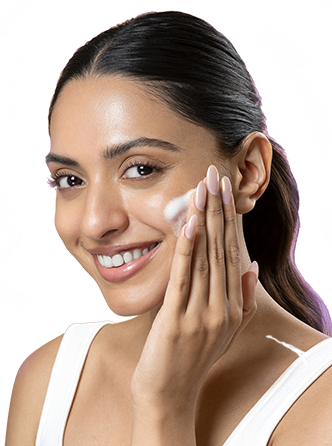
IN THIS ARTICLE
Vitamin C has long been a buzzword in the beauty industry, celebrated for its skin-loving properties. But amidst all the praise, a fair share of myths and misconceptions about it have surfaced that might deter you from enjoying the many benefits of vitamin C for the skin.
However, now it’s time to know the truth. We are here to debunk some common myths, dig into the vitamin C benefits for skin, and answer some frequently asked questions to help you make an informed decision.
Let’s begin.
What is Vitamin C?
Vitamin C, scientifically known as L-ascorbic acid, is a potent antioxidant that helps boost collagen production and is vital for maintaining skin firmness and elasticity. It also helps combat free radicals, and prevents premature aging, giving you a youthful glow.
What are the benefits of Vitamin C for the skin?

1. Reduces hyperpigmentation
Vitamin C inhibits the production of melanin, a pigment responsible for pigmentation in your skin. This helps fade dark spots and hyperpigmentation in your skin, while preventing the appearance of new ones, giving you clear, spotless skin.
2. Boosts skin glow
With its brightening and anti-aging properties, it helps clear your skin and gives you a natural glow.
3. Protects from free radicals
It is a powerful antioxidant that shields the skin from harmful free radicals and environmental damage. When used consistently, it can help slow down the signs of aging and prevent wrinkles and fine lines.
4. Boosts collagen production
With age, your skin's natural ability to produce collagen slows down, resulting in wrinkles, fine lines, and sagging. Vitamin C helps boost collagen production that leaves your skin firm & youthful!
Now that you have reasons to include vitamin C in your skincare routine, here are some vitamin C myths that you should stop believing.
Vitamin C myths you need to stop believing
Myth 1: It can make your skin sensitive to the sun and should only be applied at night
FACT: Vitamin C does not make your skin more sensitive to the sun.
Instead, being an antioxidant, it can enhance your skin's natural defense against UV damage and aid your sunscreen in protecting your skin efficiently. However, sunscreen still remains essential for daytime protection and you must not skip your SPF in the morning.
Myth 2: Vitamin C is not suitable for sensitive skin
FACT: Vitamin C is suitable for all skin types, even sensitive skin, provided you choose the right product with optimum concentration.
As a rule of thumb, when using active ingredients, ensure that you start with a lower concentration and gradually introduce it into your routine depending on how your skin reacts to it.
Myth 3: A higher percentage of Vitamin C is more efficient
FACT: Higher percentages aren't always better
If you are dealing with skin concerns like hyperpigmentation and dark spots, you might be tempted to use a high percentage of vitamin C for faster results. However, a higher percentage can cause irritation and redness in your skin.
A well-formulated composition of vitamin C products with a percentage range of up to 15% is sufficient and can be highly effective. When choosing vitamin C for your skin, start with a lower concentration and consider the other ingredients of the product as well.
Myth 4: Your skin can become resistant to vitamin C
FACT: Your skin can never become resistant to vitamin C
Your body does not produce vitamin C naturally, and you need to keep replenishing it through food and topical application. So rest assured, your skin cannot become resistant to vitamin C. However, with time, you can adjust the concentration and increase the percentage as per the tolerance level of your skin. You can use your favorite Vitamin C product every day without the fear of getting resistant to it.
Myth 5: You cannot combine vitamin C and niacinamide
FACT: You can combine vitamin C and niacinamide but in a regulated concentration.
While using Vitamin C Serum with niacinamide, restrict the niacinamide serum concentration to 5% and nothing more than that. While you can layer a 5% niacinamide face serum with 15% Vitamin C Serum in your morning or night skincare routine, avoid using it with 10% niacinamide serum, as it could be too harsh for your skin and cause irritation.
Myth 6: Vitamin C can discolor the skin
FACT: When applied correctly, vitamin C does not cause skin discoloration.
It is, in fact, known to help fade existing pigmentation and even out skin tone. If your vitamin C product is staining and causing discoloration, there could be a high chance that it has oxidized, and you should immediately buy yourself a new one.
How to use vitamin C for skin
To include vitamin C in your skincare routine, you can explore various skincare products infused with this active ingredient according to your skin type and concern. For best and faster results, you can use a vitamin C serum. However, if you are wary of including a serum in your routine directly, you can look for products infused with vitamin C like moisturizers, night creams, face wash, toner, etc.
Here we have a detailed skincare routine that you can follow to get the advantages of vitamin C:
- Cleanse your face with a gentle face wash for at least 60 seconds to remove dirt, pollutants, and impurities.
- Spritz or take a few drops of an alcohol-free toner on a cotton pad and gently dab your face.
- Apply 2-3 drops of Plum’s 15% Vitamin C face serum with Mandarin on your skin and gently dab it in.
- Apply a nourishing moisturizer.
- Apply broad-spectrum sunscreen if you are adding it to your morning skincare routine.
When to apply vitamin C serum
- You can use vitamin C serum for both AM and PM routines.
- Applying vitamin C in the morning will give you the benefit of its antioxidant properties that help shield your skin from sun damage and environmental aggressors.
- To get the most out of its anti-aging properties that help boost collagen, and improve skin firmness and elasticity, you can include it in your night skincare routine as well.
- However, while using vitamin C serum for the first time, make sure to do a patch test.
Explore the best vitamin C products for your skincare routine

Final takeaway:
Vitamin C is a powerhouse ingredient for achieving a healthy and radiant complexion and can work wonders for your skin. Add vitamin C to your skincare routine for glowing skin today.
FAQs
Q1: How to use vitamin C serum for your skin?
- Before applying the vitamin C serum, ensure your face is thoroughly cleansed.
- Using the dropper, dispense a few drops of serum (typically 2-3) onto your face.
- Apply the serum evenly to your face & dab it using gentle tapping motions. Don’t forget your neck area!
- Follow up with vitamin C moisturizer and a broad-spectrum sunscreen.
Q2: Can I use vitamin C with other active ingredients like retinol?
Combining vitamin C with other active ingredients can help increase effectiveness and give better results. However, it's essential to introduce them gradually and pay attention to how your skin responds.
You can combine vitamin C with niacinamide. However, pairing ingredients like retinol can be too harsh for your skin.
Q3: What does vitamin C do for your skin?
Vitamin C can help protect your skin against the harmful effects of free radicals and oxidative stress slowing down signs of aging. It also helps fade dark spots and hyperpigmentation, giving you clear, glowing skin.
Q4: Are there any side effects of vitamin C?
While the advantages of vitamin C for the skin are many, there are no side effects that you need to be worried about. However, always start using vitamin C with a lower concentration and gradually increase the percentage. Moreover, if you have hypersensitive skin or are prone to skin allergies, it is best to consult your dermatologist before use.



















